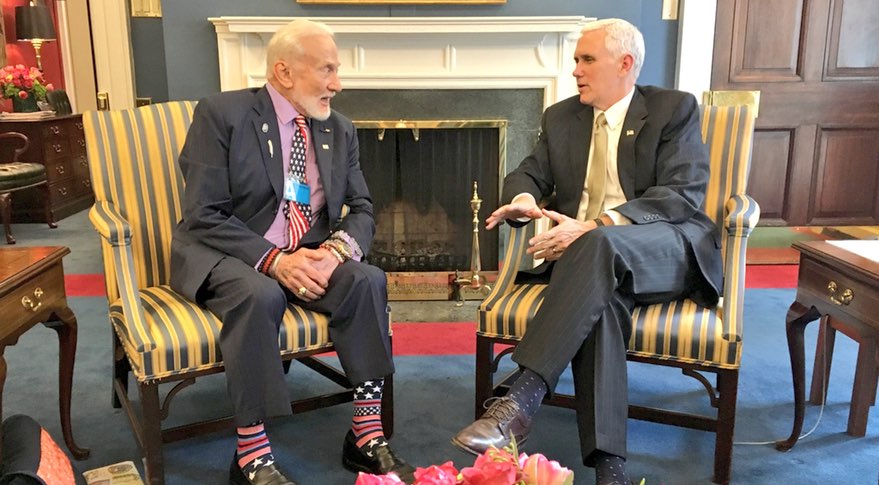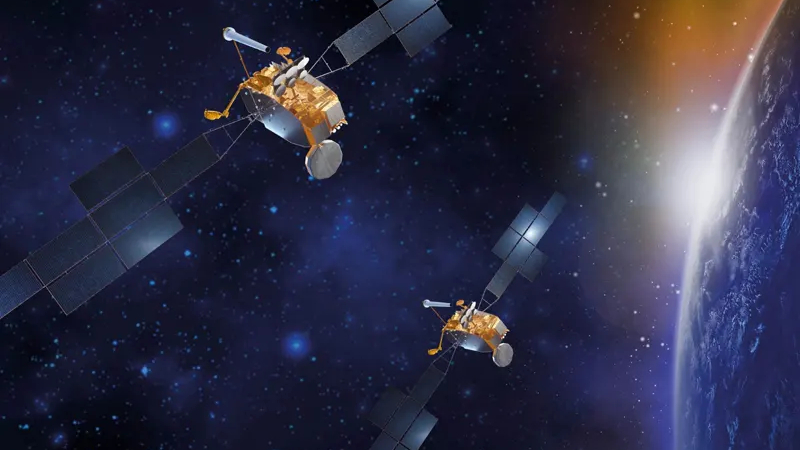Buzz Aldrin: Pence Offered Few Details of Space Policy in White House Meeting

WASHINGTON — Vice President Mike Pence didn't offer any hints about what the Trump administration might do in space when he met with Buzz Aldrin last week, the former astronaut said March 14.
A March 10 tweet from the official account of the vice president featured a picture of Pence meeting with Aldrin at the White House. "Fun to host a true American explorer, Buzz Aldrin, at the @WhiteHouse as we work to shape the space policy of our administration," the tweet stated. The White House didn't provide additional details about the meeting, and Aldrin did not respond to an email asking about the meeting.
Aldrin, in Austin, Texas, to participate in the South by Southwest (SXSW) festival March 14, was asked about his meeting with Pence in a Facebook Live interview organized by SXSW after his speaking appearance, which had an emphasis on human Mars exploration. "What did he say? Did he say he was going to work on it?" interviewer Shira Lazar asked Aldrin of his discussion with Pence.
"No, he's not in a position to be able to do that. He has a number of things that he's doing," Aldrin responded. "But he took note some suggestions and some offers of assistance. It was very friendly, very satisfying. I felt very good at the end of the meeting, and I hope he did too."
Pence is widely expected in the space community to take a leading role in the development of the Trump administration's space policy. Statements of the Trump campaign's proposed policy made prior to the November election said that the administration would reestablish the National Space Council, which last operated when George H.W. Bush was president. At that time, and in earlier administrations, the council was led by the vice president.
"He is excited about doing the space council," Robert Walker, the former chairman of the House Science Committee who crafted that campaign position, said of Pence in a December interview. "He has expressed absolute excitement about that particular role. I think that will be a place where he will find time for it."
The administration, though, has yet to announce the creation of the space council, despite rumors it would be established shortly after President Trump took office Jan. 20. It has also, to date, not provided details about prospective changes to national space policy.
Breaking space news, the latest updates on rocket launches, skywatching events and more!
Aldrin used his appearance at SXSW to talk about his vision for human exploration of Mars. That included detailed discussions about his concept for Mars "cycler" spacecraft that would transit between the Earth and Mars, providing regular transportation to support the creation of a permanent base there.
But as the new administration reportedly shows greater interest in sending humans to the moon, Aldrin said lunar missions could play a role in Mars settlement by testing systems intended for use on Mars. "The moon enables us to go to Mars," he said. "It's almost mandatory, in my way of thinking, because the base that we want on Mars we will design and place it on the moon."
That could be done with international partners, Aldrin said, tying into interest by other nations in lunar exploration. "At the moment we're seeing a renewed interest in the moon," said Time magazine editor at large Jeffrey Kluger, who appeared on stage with Aldrin and in the later Facebook Live interview. "The moon has suddenly become the 'it' world as it was in the 1960s."
Aldrin also acknowledged the "bodacious" plans for Mars missions announced by SpaceX founder Elon Musk in a September presentation at the International Astronautical Congress in Mexico. However, Aldrin said that Musk hadn't yet demonstrated the same attention to detail about what's needed for humans to live once they arrive on Mars.
"He's a transportation person. He knows rockets," Aldrin said of Musk. He recalled a meeting a few years ago where Musk outlined plans for sending people to Mars, but had fewer details about how those people would live and work there. "It seems as though maybe he hasn't given that a lot of thought."
This story was provided by SpaceNews, dedicated to covering all aspects of the space industry.

Jeff Foust is a Senior Staff Writer at SpaceNews, a space industry news magazine and website, where he writes about space policy, commercial spaceflight and other aerospace industry topics. Jeff has a Ph.D. in planetary sciences from the Massachusetts Institute of Technology and earned a bachelor's degree in geophysics and planetary science from the California Institute of Technology. You can see Jeff's latest projects by following him on Twitter.

